'China was a relationship from which Mr Modi had expected the most it seems.'
'It showed in a string of summits, and somewhat breathless celebration of Xi Jinping.'
'It was hasty and simplistic,' observes Shekhar Gupta.
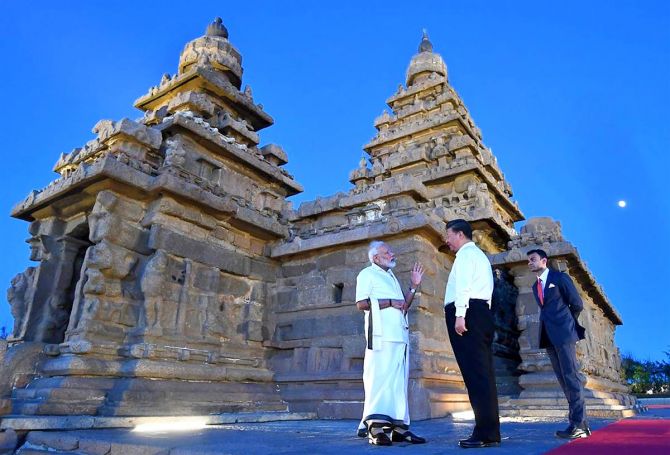
Let's first list all the things that have gone right for the Narendra Damodardas Modi government on strategic and foreign policy.
The relationship with the US is on top of that list.
As the Chinese turned nasty, the US is the only country in the world that spoke out loudly and unqualifiedly for India.
Also, at this juncture, it did so in a purely non-transactional manner.
That hasn't happened often in Indian strategic history.
Not since the end of the Cold War more than three decades ago.
It isn't even just the shared dislike of China.
Beginning with Uri, the surgical strikes, Pulwama, Balakot, the Article 370 changes, and now to Ladakh, the American support has been quite evident and unconditional.
It is not a relationship hyphenated either with Pakistan or China.
We continue with good news.
The larger regional allies, essentially in the Indo-Pacific, have held firm -- Japan and Australia, in particular, the two other members of the Quad.
There, the shared threat of China is a binding factor.
The unequivocal support, however, is heartening.
Similarly, the Arabian powers have stayed firmly non-partisan in the big picture, unlike in the past when they leaned towards Pakistan.
Saudi Arabia and the UAE, in particular, and meanwhile ties with Israel have become more productive.
There is a problem in Turkey and Qatar, but it was always there, whatever the pretence.
Both are essentially in cahoots with the Muslim Brotherhood and hostile to India, the latter only more sophisticated about it than the former.
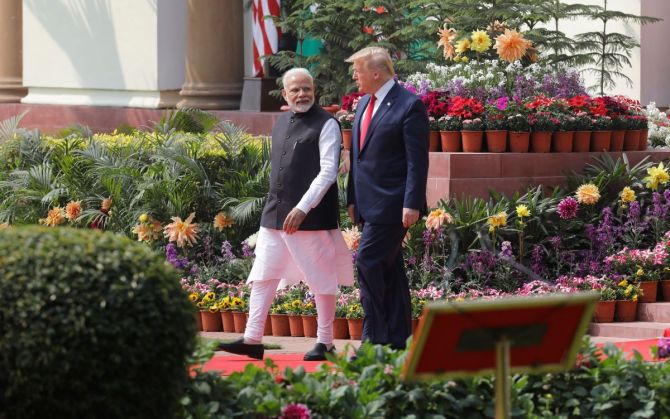
Has the relationship with Iran worsened, or improved?
The last several days' headlines would indicate that the equation is going downhill.
But, given that unlike China and Russia, India was not strong enough to risk American sanctions, there wasn't much choice available. To Iran, or India.
Possibly, it is better to be pragmatic about Iran.
Over the past many years, while the Arab powers have mostly stayed out of India's internal (Kashmir, communal relations) issues, Iran has interfered crudely.
Overall, you might still be inclined to say, so far, so good.
That is where bad news begins.
Much of what hasn't gone right, paradoxically, is linked to what has.
The relationship with America, for example.
Despite Washington's responses so far, including the administration's spirited defence of India in Congressional hearings on human rights situations in Kashmir and the CAA/NRC controversy, the overall relationship has remained transactional at a low, 'small-deal' level.
It hasn't been consummated like a 'big deal' strategic alliance.
The reason is the Modi government's inability to break out of historic obsessions with reluctant embraces, multiple alliances, and that quaint, Indian notion of strategic autonomy.
Even at the transactional level, Mr Modi's reluctance to sign even a tiny trade deal with Donald Trump underlines his inability to shed this chronic Indian diffidence.
He happily went to Houston and chanted 'ab ki baar, Trump sarkar' and thereby endorsed his candidacy for re-election, never mind the context.
But he wouldn't move on even a tiny trade deal.
This, after so many commitments, promises and false hopes.
Mr Trump flew all the way to India in the early coronavirus season on a short visit mostly looking for a tiny campaign win such as this.
But for the Modi government, misplaced ideology and irrational fear of global trade continued to drive India's larger strategic interest.
This minimalism left no area of the relationship, even military, untouched.
In six years, India did buy a few small parcels of this and that from America.
But no major acquisition, co-development or production started.
None. It is a different matter that now, when the Chinese have rudely kicked the door open in Ladakh, you have C-17s and C-130s, Apaches, Chinooks, and M777 artillery to rely on.
All of it has come from America, in retail purchases.
Any of these could have been a larger, balance-shifting, co-production deal if the Modi government was willing to think big.
We've come this far without mentioning Russia.
This looks like an error if we remember, that when the stuff hit the fan in Ladakh, the first country Defence Minister Rajnath Singh went rushing to was Russia.
The first two emergency orders, Su-30s and MiG-29s, too were placed there.
Please note again, in tiny parcels.
What this underlines is that 31 years after the end of the Cold War, through 25 years of steep economic growth and now six years under Mr Modi, India has not gotten over its military dependence on Russia.
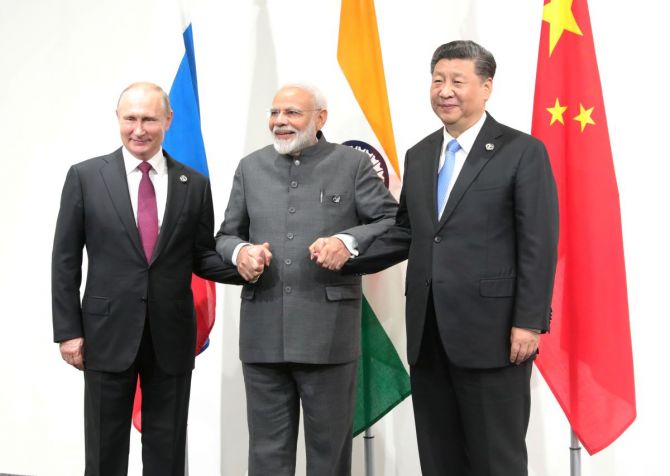
That counts as a failure, especially at a time when Russia has emerged to be China's loyal ally.
Knowing India's dependence and vulnerabilities, lack of options and resources, it knows it can afford to play even low-level games with it.
It has delivered S-400s to China, sold them subsequently to India, and may give them to Turkey as well.
It isn't anybody's strategic ally except its own, and China's.
A sounder foreign policy would have lessened this dependence, thereby improving India's leverage.
China was a relationship from which Mr Modi had expected the most it seems.
It showed in a string of summits, and somewhat breathless celebration of Xi Jinping.
It was hasty and simplistic.
To imagine that you could sway a Chinese strongman on personal buddy-ship was a sizeable error. India is now paying for it.
Over-personalisation of diplomacy can work between two nations that are equal.
Or if they are unequal, you are the stronger one.
Diplomacy between two sizeable but unequal neighbours is not played successfully like jujitsu, where you use the adversary's strengths against him.
There was also a definite misreading of Mr Xi's intentions, his powers, and the way in which the Chinese system works.
While Mr Xi is the most powerful Chinese leader since Deng, as an individual, he might have less personal discretion over larger policy than a Modi.
India's handling of him was immature, and since he kicked us in the shins in Doklam, the equation has shifted.
It is now quite clear that he read Wuhan as Mr Modi pleading with him not to create more mischief and upset his prospects in the coming elections.
In these exchanges, if you respect the other side, you'd know that the Chinese think, too.
And they make their own assessment of your intentions, as you make of theirs.
It doesn't even matter who was right or wrong.
What matters is what you get at the end of the day. That, in one word, is Galwan.
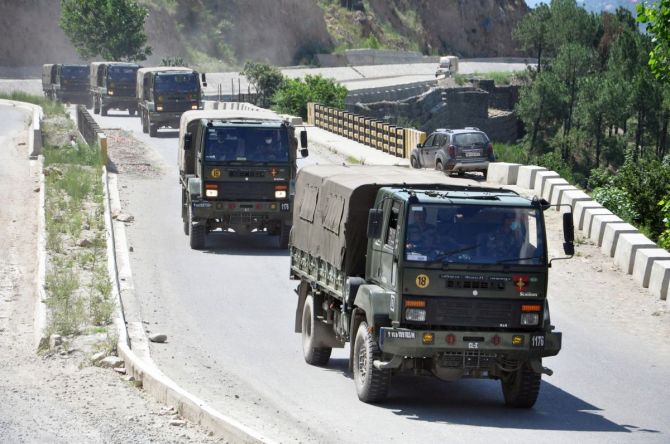
After the misplaced ideological paranoia of trade and over-personalised diplomacy, the next big negative was the way the Modi-BJP electoral politics got caught in foreign policy.
If Hindu-Muslim polarisation is your main vehicle of winning elections, then the 'othering' of the Muslim is essential.
Never mind that it closes your options with Pakistan.
But it also troubles your most reliable neighbour, Bangladesh.
Mr Modi had started off well, sealing the border settlement with Bangladesh in the national interest which his party had not allowed the UPA to do.
But then, the desperation to first win Assam, then West Bengal, ruined that start.
You cannot be calling Bangladeshis infiltrators and termites and threaten to deport them, on the one hand, and whisper the opposite to Sheikh Hasina, on the other.
You can be sure that after sealing Iran, Nepal, and Sri Lanka now, China will turn its attention to Dhaka.
Wasn't there an important, zero-tariff trade deal in the works these last few weeks? Check.
Objects in the mirror are closer than they seem. India is paying the price for the Modi-BJP electoral politics.
Powerful leaders with huge popularity have many strengths.
But they also have some weaknesses.
One of these is sycophancy. If they begin to enjoy it, then history tells you how disastrous the results are, without an exception.
India's strategic policy-making needs hard introspection, realism, and course correction.
Not just in method and style, but in substance and fundamental politics.
Especially at home. A polarised electorate might be good for a party. But a divided population is dangerous for a nation.
By special arrangement with The Print
Feature Presentation: Aslam Hunani/Rediff.com

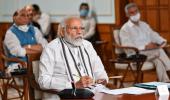
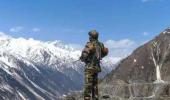
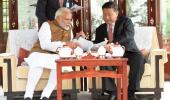
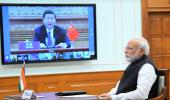
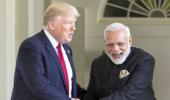






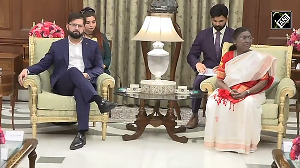
 © 2025
© 2025